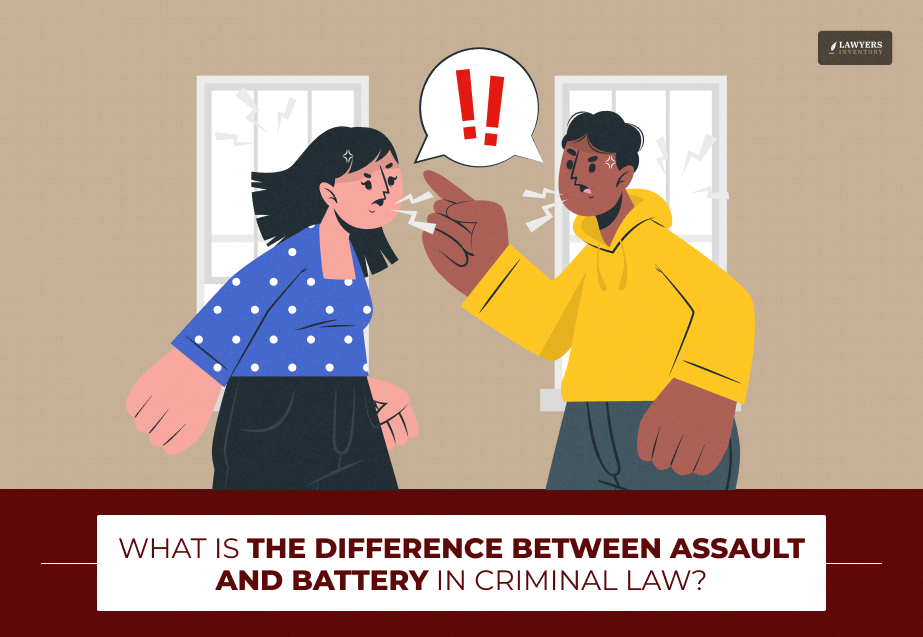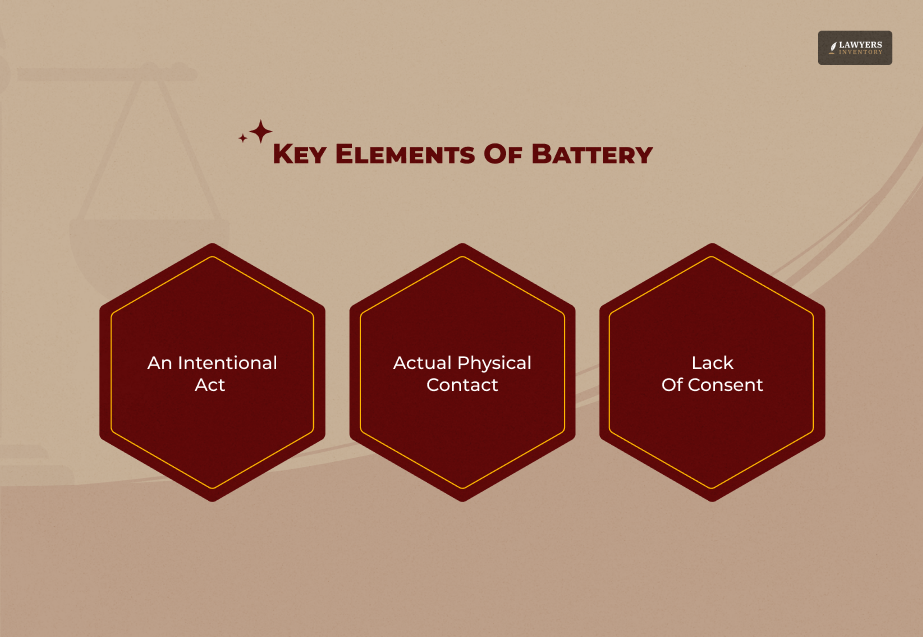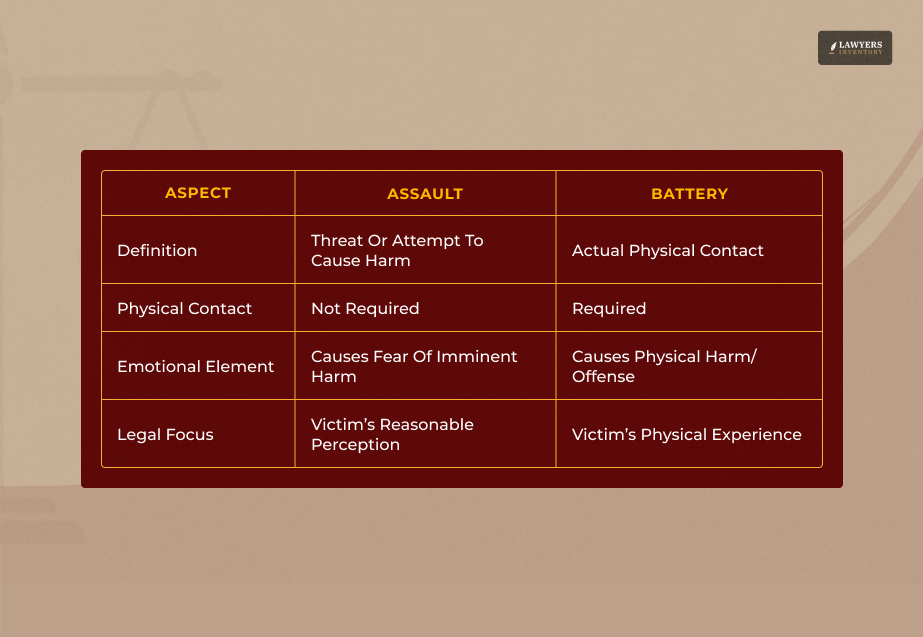
People often confuse the terms assault and battery because they are sometimes used together in everyday conversation. In reality, they are distinct legal concepts in criminal law. While both involve harm or the threat of harm, the difference lies in whether physical contact occurs.
As a citizen of the country, it is best that you learn this distinction. This is primarily because the charges, penalties, and defenses vary significantly depending on whether someone is accused of assault, battery, or both.
In this article, I will explain the following things:
- What is an assault and a battery in criminal law?
- What is the difference between assault and battery?
- The legal consequences that you face for assault and battery.
- The defenses against assault and battery charges.
Therefore, if these are some of the things that you want to know, keep on reading this blog till the end…
What Is An Assault?

Assault is generally defined as an intentional act that causes another person to reasonably fear imminent harmful or offensive contact. Importantly, actual physical contact is not required for assault to occur.
The Legal Information Institute mentions that when it comes to assault, it is not necessary for a physical injury actually to take place. However, “the actor must have intended to cause a harmful or offensive contact with the victim and the victim must have thereby been put in immediate apprehension of such a contact.”
Key Elements Of Assault
Here are some of the key elements of assault under the criminal law:
- Intent: The offender must act deliberately.
- Fear of harm: The victim must reasonably believe they are about to be harmed.
- Imminence: The threat must be immediate, not a distant or vague danger.
Examples Of Assault
Having a clear understanding of what an assault is might seem tricky at first. Here are some examples that might make the act clear for you:
- Raising a fist as if to punch someone.
- Pointing a gun at a person, even if it is unloaded.
- Swinging at someone but missing.
Note: In some states, like California, assault is defined as an unlawful attempt to commit a violent injury under the Penal Code § 240, while other states consider only the threat of harm as assault.
What Is A Battery?

Battery occurs when there is actual unlawful physical contact with another person. Unlike assault, which requires no touching, battery requires offensive or harmful contact, even if the injury is minor.
“The legal definition of battery is the intentional touching of (or application of force to) the body of another person in a harmful or offensive manner without consent,” according to FindLaw. Additionally, you should also keep in mind that this legal definition applies to both criminal law and personal injury law.
Key Elements Of Battery
Here are some of the key elements of battery under the criminal law:
- Intentional physical contact: Not accidental.
- Harmful or offensive nature: Even minimal contact (like spitting) can qualify.
- Lack of consent: The victim did not agree to the contact.
Examples Of Battery
Having a clear understanding of what a battery is might seem tricky at first. Here are some examples that might make the act clear for you:
- Punching, slapping, or kicking someone.
- Grabbing someone aggressively.
- Spitting on another person.
Note: Some states combine assault and battery into one offense called “assault and battery.” For instance, Virginia law defines “assault and battery” together under Code of Virginia § 18.2-57.
What Is The Difference Between Assault And Battery?
You might have already gotten a clear idea of the fact that both these terms, even though used interchangeably, are different. Additionally, the charges that you might face also differ from each other.
Take a look at this chart for a better idea about how these two violent acts differ from each other under criminal law:

According to Nolo, previously “assault and battery were considered separate crimes, with battery requiring that the aggressor physically strike or offensively touch the victim.” Which means that battery was basically an assault that was “complete.”
Several jurisdictions have gotten rid of the term battery and now only prosecute varying degrees of assault cases. Generally speaking, a person commits assault and battery in most states when they physically hit or tried to hit someone. Or when they make a threatening gesture with the intent to frighten the other person into fear of immediate harm.
Some states also categorize the assault or battery case as a separate entity under the title of aggravated assault or battery, according to FindLaw. There are numerous ways to escalate assault.
For instance, leading to serious bodily injury or the use of a deadly weapon are among the factors that can aggravate the assault. Some places define the act of purposely harming defenseless people as aggravated assault.
What Is The Legal Consequence Of Assault And Battery?
Both assault and battery can carry serious legal consequences, depending on the severity of the act and state law.
For example, when it comes to criminal penalties:
- Misdemeanor charges: Minor assault or battery may result in fines, probation, community service, or up to one year in jail.
- Felony charges: Aggravated assault or battery (involving weapons, serious injury, or vulnerable victims) can lead to years in prison.
Knowing the difference and the legal consequences helps you get the right legal help. For instance, if you are from Walton County, you will be able to choose the right aggravated assault defense attorney Walton County offers.
Additionally, when it comes to the civil liability, you should know that the victims can sue perpetrators for damages in civil court, including compensation for:
- Medical bills.
- Pain and suffering.
- Emotional distress.
Note: Some of the most common aggravating factors that are identified in assault and battery cases include the following:
• Use of a deadly weapon.
• Battery against a child, elderly person, or police officer.
• Causing serious bodily harm.
What Are The Legal Defenses Used Against Assault And Battery Charges?
Defendants may raise several defenses, depending on the facts of the case. Here are the most common
- Self-defense: The accused acted to protect themselves from imminent harm.
- Defense of others: The accused acted to protect another person.
- Consent: The victim agreed to the conduct (common in sports).
- Lack of intent: The act was accidental and not intentional.
For example, football tackle during a game may not be considered battery because the players consented to physical contact within the rules of the sport.
Why Does The Difference Matter Between Assault And Battery?
The primary distinction between assault and battery is the question of whether there was physical contact.
While assault is the threat or attempt to inflict injury, battery justifiably demands that there be actual unwanted or harmful touching. Moreover, any of these wrongdoings can result in a criminal case being filed and a lawsuit for damages, as well as the permanence of certain consequences.
Identifying whether a case falls under assault or battery can:
- Influence the nature of the crime and the severity of the punishment: The law may consider a mere threat without contact to be a lesser offense in comparison with an actual physical attack.
- Reach the criminal record: The decisions of assault and battery can maximize the length of the repercussions of which may include the inability of the convicted to get jobs or the loss of certain professional licenses.
- Define types of relief in non-criminal law: Those who are physically attacked are more likely to be paid by the offenders because of the tangible nature of the crime.
- Help to eliminate misunderstandings: The majority of people mistakenly refer to “assault” as an all-encompassing term, however, in court, exactness is quite significant.
If you are accused of assault or battery—or in the position of the victim—it would be so important for you to get in touch with a criminal defense lawyer that is qualified and experienced in your area of jurisdiction, who will then be able to give you the correct advice for your case.











0 Reply
No comments yet.